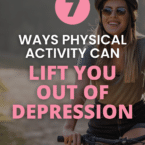
We all know the physical benefits of regular exercise – it keeps our bodies fit, boosts energy levels, and even improves our longevity. But did you know that exercise can be just as beneficial for our mental health? In this article, we will delve into how physical activity can be a powerful ally in lifting you out of depression.
Depression can make it tough to get out of bed, let alone work out. But if you can manage to move your body, the rewards are significant. Let’s delve into the science behind the exercise-depression relationship, and then we’ll share seven ways that physical activity can help you manage depression.
The Science Behind Exercise and Depression
Exercise is known to have a “feel-good” effect. When you exercise, your body releases chemicals like endorphins, dopamine, and serotonin. These are often referred to as “feel-good” hormones, as they are linked with mood regulation. They can help to reduce feelings of anxiety and depression, boost your mood, and improve your overall sense of well-being.
Research indicates that regular exercise can have a profoundly positive impact on depression and anxiety disorders. It also relieves stress, improves memory, helps you sleep better, and boosts overall mood. Exercise is a powerful depression fighter, mainly because it promotes all kinds of changes in the brain, including neural growth, reduced inflammation, and new activity patterns that promote feelings of calm and well-being.
7 Ways Physical Activity Can Lift You Out of Depression
1. Regular Walking: Small Steps to Big Changes
Walking might seem too simple, but don’t underestimate its power! Regular brisk walks, whether in a local park or around your neighborhood, can help clear your mind, improve your mood, and reduce stress. Plus, it’s an easy way to get moving without needing any special equipment or memberships.
2. Yoga: Balancing Body and Mind
Yoga combines physical postures, breathing exercises, and meditation. This trio can help reduce depressive symptoms, calm the mind, and relieve stress. Whether you join a class or follow an online tutorial, yoga is an accessible form of exercise that can be adapted to any fitness level.
Related: 10 Mindful Strategies to Dig Yourself Out of Depression >>
3. Strength Training: Building Physical and Mental Resilience
Lifting weights or doing bodyweight exercises like push-ups and squats can make you physically stronger, which can also foster a sense of mental resilience. Plus, the focus required during strength training can serve as a distraction from negative thoughts.
4. Running or Cycling: High-Intensity Mood Boosters
Running or cycling can be effective ways to combat depression. These high-intensity exercises trigger the release of endorphins, the body’s natural mood lifters. If you’re new to these activities, remember it’s okay to start small and gradually increase your intensity as your fitness improves.
5. Dance: The Power of Rhythm and Joy
Dancing combines movement with music, both of which can have a positive impact on your mood. Join a dance class, follow an online tutorial, or just dance around your living room. The goal is to move your body and have fun!
6.Team Sports: Combining Physical Activity and Social Interaction
Team sports have a double benefit. They get you moving and provide an opportunity for social interaction, which can be particularly beneficial if you’re feeling isolated due to depression. Whether it’s soccer, basketball, or even a local ultimate frisbee group, team sports can provide a sense of connection and shared accomplishment.
7. Outdoor Activities: Exercise in the Heart of Nature
Activities like hiking, kayaking, or gardening combine physical activity with the therapeutic effects of being in nature. These activities can help you focus on your senses, calm your mind, and boost your mood.
Related: 8 Steps to Building a Support Network to Pull Yourself Out of Depression >>
Final Thoughts
Physical activity can be a powerful tool in your depression management toolkit. But it’s important to note that while exercise is a beneficial complement to other treatment methods, it’s not a replacement for professional help if your depression is severe or persistent. Always consult with a healthcare professional if you’re struggling with depression.
Resources
If you’re feeling suicidal or need immediate help, please reach out to a trusted professional or contact a crisis line like the National Suicide Prevention Lifeline at 1-800-273-TALK (1-800-273-8255) or use the Crisis Text Line by texting HOME to 741741 (United States).
For more information on physical activity and mental health, check out resources like the Mayo Clinic or the American Psychological Association. For depression and mental health resources, consider websites like the National Institute of Mental Health or the Depression and Bipolar Support Alliance.
Remember, everyone’s journey with depression is different, and what works for one person might not work for another. The key is to find the activities you enjoy and can stick with, and remember, it’s okay to start small. Even a few minutes of physical activity can make a difference.
















